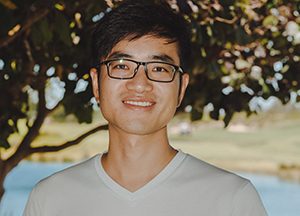Three FLEET Research Fellows are amongst those receiving DECRA Fellowships in ARC announcements this week.
Congratulations to:
- Dr Matt Reeves (UQ) Calming the Superfluid Storm: Taming Turbulence in Superfluid Devices
- Dr Eli Estrecho (ANU) Mixing light and matter with complex gauge fields
- Dr Qingdong Ou (Monash) Engineering twisted 2D materials for mid-infrared detectors.
Dr Matt Reeves (UQ) Calming the Superfluid Storm: Taming Turbulence in Superfluid Devices. Turbulence, the chaotic flow of fluids, occurs in the vast majority of fluid flows in nature. Matt’s project seeks a new understanding of turbulence in superfluids, a class of quantum fluids which can flow without friction. Aspects of turbulence are universal, so discoveries in superfluid turbulence will provide fundamental insights into all forms of turbulence. Namely, solutions to two outstanding questions – what are the universal laws of turbulent flow for superfluids, and what new forms of quantum vortex matter are possible? New insights into turbulence will benefit all applications which rely on its understanding, for example in medicine, aviation, and climate modelling.
Dr Eli Estrecho (ANU) Mixing light and matter with complex gauge fields. Quantum fluids of light and electronic matter provide a practical route towards technological applications of collective quantum effects that were previously only possible at extreme conditions. However, progress in harnessing these effects, such as the flow of synchronised particles without resistance, is hindered by the weak interaction of the hybrid light-matter particles with electromagnetic fields. Eli’s project aims to engineer artificial fields that can easily control these hybrid particles and their flow in semiconductors at ambient conditions, benefitting the design of low-energy devices and new quantum technologies based on hybrid light-matter quantum fluids.
Dr Qingdong Ou (Monash) Engineering twisted 2D materials for mid-infrared detectors. This project aims to engineer twisted 2D materials and develop efficient room-temperature mid-infrared detectors that sense both the intensity and polarisation of light. Qingdong’s project expects to generate a cost-effective, ultra-compact, and multifunctional mid-infrared optical platform with high energy conversion efficiency towards advanced sensing and imaging systems, delivering high value-added devices with reduced energy consumption for the electronics and photonics industries. Significant economic and environmental benefits will come from savings in materials and energy costs, and reduced environmental impact in advanced manufacturing.
The Australian Research Council Discovery Early Career Researcher Award (DECRA) scheme, part of the Discovery Program, provides focused support for researchers and creates more opportunities for early-career researchers. Read the announcement online.




